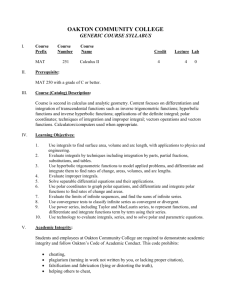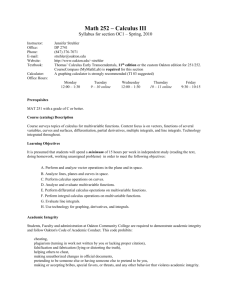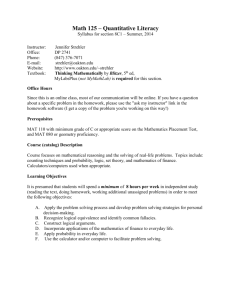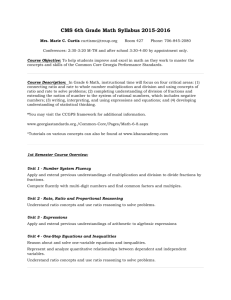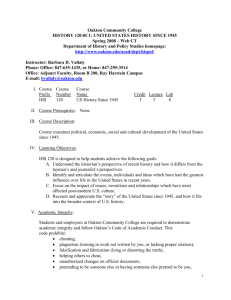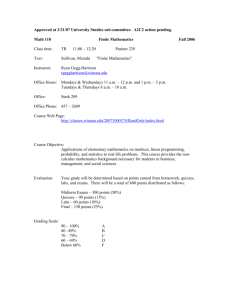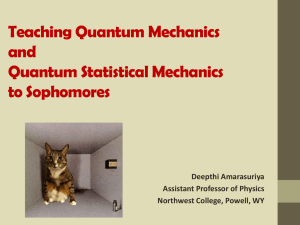Syllabus
advertisement
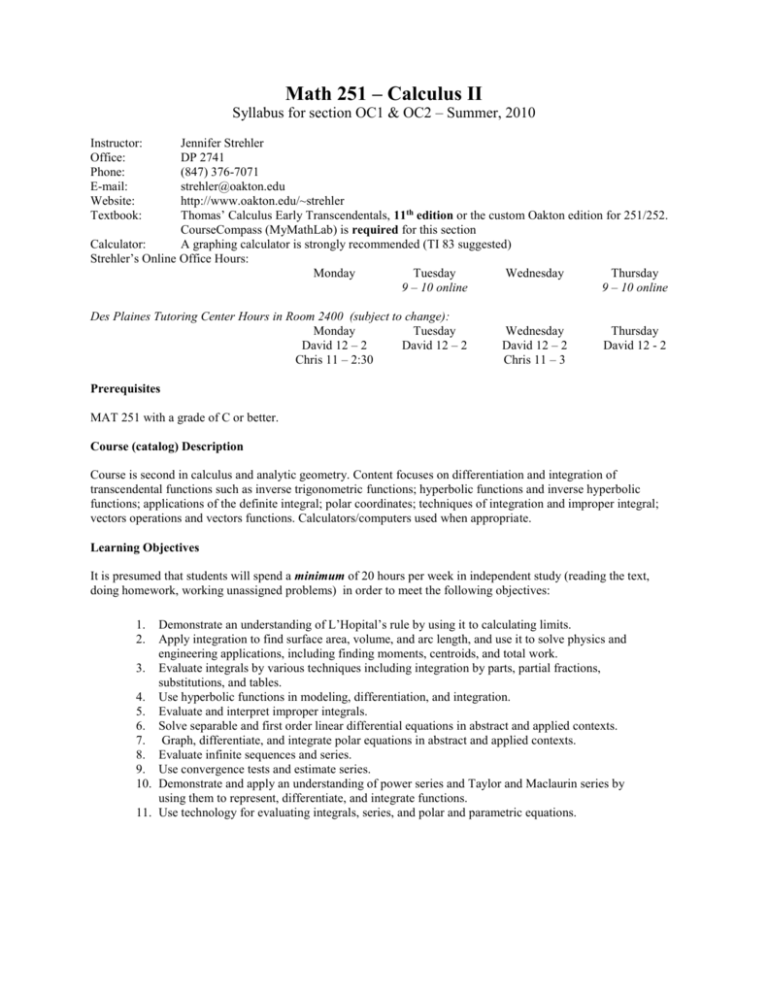
Math 251 – Calculus II Syllabus for section OC1 & OC2 – Summer, 2010 Instructor: Office: Phone: E-mail: Website: Textbook: Jennifer Strehler DP 2741 (847) 376-7071 strehler@oakton.edu http://www.oakton.edu/~strehler Thomas’ Calculus Early Transcendentals, 11th edition or the custom Oakton edition for 251/252. CourseCompass (MyMathLab) is required for this section Calculator: A graphing calculator is strongly recommended (TI 83 suggested) Strehler’s Online Office Hours: Monday Tuesday Wednesday Thursday 9 – 10 online 9 – 10 online Des Plaines Tutoring Center Hours in Room 2400 (subject to change): Monday Tuesday David 12 – 2 David 12 – 2 Chris 11 – 2:30 Wednesday David 12 – 2 Chris 11 – 3 Thursday David 12 - 2 Prerequisites MAT 251 with a grade of C or better. Course (catalog) Description Course is second in calculus and analytic geometry. Content focuses on differentiation and integration of transcendental functions such as inverse trigonometric functions; hyperbolic functions and inverse hyperbolic functions; applications of the definite integral; polar coordinates; techniques of integration and improper integral; vectors operations and vectors functions. Calculators/computers used when appropriate. Learning Objectives It is presumed that students will spend a minimum of 20 hours per week in independent study (reading the text, doing homework, working unassigned problems) in order to meet the following objectives: Demonstrate an understanding of L’Hopital’s rule by using it to calculating limits. Apply integration to find surface area, volume, and arc length, and use it to solve physics and engineering applications, including finding moments, centroids, and total work. 3. Evaluate integrals by various techniques including integration by parts, partial fractions, substitutions, and tables. 4. Use hyperbolic functions in modeling, differentiation, and integration. 5. Evaluate and interpret improper integrals. 6. Solve separable and first order linear differential equations in abstract and applied contexts. 7. Graph, differentiate, and integrate polar equations in abstract and applied contexts. 8. Evaluate infinite sequences and series. 9. Use convergence tests and estimate series. 10. Demonstrate and apply an understanding of power series and Taylor and Maclaurin series by using them to represent, differentiate, and integrate functions. 11. Use technology for evaluating integrals, series, and polar and parametric equations. 1. 2. Academic Integrity Students, Faculty and administration at Oakton Community College are required to demonstrate academic integrity and follow Oakton's Code of Academic Conduct. This code prohibits: cheating, plagiarism (turning in work not written by you or lacking proper citation), falsification and fabrication (lying or distorting the truth), helping others to cheat, making unauthorized changes in official documents, pretending to be someone else or having someone else to pretend to be you, making or accepting bribes, special favors, or threats, and any other behavior that violates academic integrity. There are serious consequences to violations of the academic integrity policy. Oakton's policies and procedures provide students with a fair hearing if a complaint is made. If you are found to have violated the policy, the minimum penalty is failure on the assignment and a disciplinary record will be established and kept on file in the office of the Vice President for Student Affairs for a period of 3 years. Details of the Code of Academic Conduct can be found in the Student Handbook. Course Expectations I expect that you will log into CourseCompass and work regularly (at least once a week) toward the successful completion of this course. I expect that your schedule will allow you to take the exams and quizzes when they are scheduled. All exams, quizzes and assignments have firm due dates and requests for extensions will NOT be granted. The exams will be available in the testing center for three business days (M-R) prior to the exam due date. Quizzes and homework can be completed early. Academic integrity. All work is expected to be your own. Ask for help when you need it. The tutoring center (room 2400 DP), the free publisher-provided tutoring http://www.aw-bc.com/tutorcenter/math.html and my online office hours are excellent resources for help. Communication I will send several e-mails to the entire class during the course of the semester. It is your responsibility to ensure that the e-mail address on file with the registrar is the address to which you wish to receive course communication. Please use e-mail as your primary means of communication. I will read and respond to e-mail at least once a day during the week. The time I check my e-mail is likely to be irregular. If you send me a message at 8:30 am & I checked my e-mail at 7:30 that morning, I may not get your message until whenever I check e-mail the next day. It is unlikely that I will check e-mail on weekends. I am teaching more than one course this summer. Make sure you put MAT 251 in the subject line of your e-mail so that I know which class you are in (and that your e-mail is not spam!) Assignments, Quizzes and Exams All homework, quizzes and exams have firm dates. Extensions will NOT be granted. Homework will be done through CourseCompass and is based on chapters 6 - 11 of the textbook. Homework must be completed no later than the day before the due date for the exam that will cover that material. There will be six chapter quizzes, which will be administered through CourseCompass. Quizzes must be taken no later than the day before the due date for the exam that will cover that material. There will be two exams that will be administered at the testing center located on the Des Plaines campus of Oakton Community College. If you need to take the exam at the Skokie campus, it is your responsibility to inform me no later than one week before the exam. If you are not able to take the exams at one of our campuses, please contact Robin Nash at rnash@oakton.edu in order to make alternative arrangements as soon as possible. The testing center is open Monday - Thursday from 8am 8pm. The testing center is not open Friday or Saturday during the summer. You will be given 3 hours to complete each exam. If you arrive after 5pm Monday – Thursday for an exam, you will only be allowed to work on the exam until the testing center closes and no additional time will be given for the exam. The due dates of these exams are listed below. Grading Exam 1 Available 6/28/10 – 7/1/10 Exam 2 Available 7/26/10 - 7/29/10 Homework Average Quiz Average 30% 30% 20% 20% Course grades will be determined as follows: 90% - 100% 80% - 89% 70% - 79% 60% - 69% Less than 60% A B C D F A grade if "I" (Incomplete) must be formally requested of the instructor by the student and may be granted only if the student has missed no more than one test for the entire term and the student’s average is at least 70. The decision to grant the "I" grade will be made by the instructor alone. No incomplete grades will be given without documented evidence of serious illness or circumstances. If you have a documented learning, psychological, or physical disability you may be entitled to reasonable academic accommodations or services. To request accommodations or services, contact the ASSIST office in Instructional Support Services. All students are expected to fulfill essential course requirements. The College will not waive any essential skill or requirement of a course or degree program. Outline of Topics A. L’Hopital’s Rule and Review of Differentiation and Integration (Sections 4.6 and 5.6) 1. L’Hopital’s Rule (and review of rules of differentiation) 2. Using basic integrals and substitutions to find the area between curves B. Applications of the Definite Integral (Sections 6.1 through 6.7) 1. Volumes using cross-sectional areas 2. Volumes of solids of revolution using discs, washers, and shells 3. Arc length and Surface Area of Revolution 4. Work, hydrostatic pressure and force, moments, and center of mass C. Hyperbolic Functions: Graphing, Differentiating, Integrating (Section 7.4) D. Techniques of Integration (Sections 8.1 through 8.6) 1. Integration by parts 2. Integration of rational functions by partial fractions 3. Integration of trigonometric functions 4. Trigonometric substitutions 5. Integration using tables E. Improper Integrals (Section 8.8) 1. Infinite limits of integration 2. Integration over discontinuities F. Differential Equations and Their Applications (Sections 9.1, 9.2, and 9.5) 1. Separable differential equations 2. First order differential equations 3. Applications G. Polar Coordinates (Sections 10.5, 10.6, and 10.7) 1. Graphing with polar coordinates 2. Integration and differentiation using polar coordinates 3. Applications including area, arc length and surface area H. Infinite Sequences and Series (Sections 11.1 through 11.9) 1. Sequences and series 2. Geometric series 3. Tests for positive terms (integral, comparison, ratio, n'th root) 4. Alternating series 5. Absolute and conditional convergence 6. Power series, Taylor and Maclaurin series 7. Applications including binomial series and solution to differential equations I. Recommended Technology 1. Use of technology to evaluate integrals 2. Use of technology to investigate improper integrals 3. Use of technology to investigate differential equations 4. Use of technology for graphing, integrating, and differentiating parametric and polar
